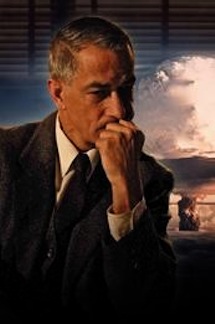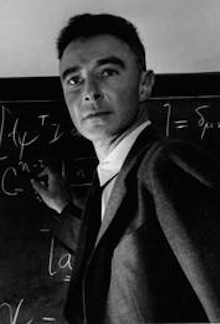An explosive beginning to 21st season of American Experience
01/26/09 12:00 PM


By ED BARK
The father of the World War II era atomic bomb was a "frail, frequently sick" pantywaist as a kid, never had a date at Harvard and was derided after the fact by President Truman as "that crybaby scientist."
These dichotomies between the man and the so-called "Manhattan Project" he headed are compellingly revisited in PBS' The Trials of J. Robert Oppenheimer. The two-hour film premieres Monday, Jan. 26th at 8 p.m. (central) on KERA/Ch. 13, opening the 21st season of American Experience with a decidedly big bang.
Filmmaker David Grubin (RFK, Truman, Napoleon) effectively deploys David Strathairn as Oppenheimer in scenes from a nearly four-week courtroom hearing that ended in the revocation of his national security clearance. Strathairn already is accustomed to chain-smoking his way through a period piece after playing Edward R. Murrow in 2005's Good Night, and Good Luck, for which he received an Oscar nomination.
Oppenheimer's testimony, taken verbatim from the hearing, is intercut with the improbable life story of a man who was both wracked by self-loathing and teeming with arrogance.
"He just skipped being a boy," writer Patricia J. McMillan says of Oppenheimer's lost youth, during which schoolmates nicknamed him "Booby" Oppenheimer.
He over-compensated as an adult, browbeating and belittling his students after earning national renown as a theoretical physicist. His best friends were social activists, some of them members of the Communist Party. That became a major problem for him during the post- World War II "Red Scare" fueled by Communist-hunting Sen. Joe McCarthy of Wisconsin.
The PBS film tells of the constant government scrutiny of Oppenheimer, even while he headed the all-consuming U.S. effort to beat Germany to the atomic bomb punch at the height of World War II. His activities were closely watched, and in some cases wiretapped. It's an amazing story, strange but all too chillingly true.
The bomb that Oppenheimer and his charges perfected was dropped on Hiroshima, Japan on Aug. 6, 1945. Three days later, a second bomb left much of Nagasaki in ruins.
Post World War II, the arms race escalated while Oppenheimer became increasingly morose over what he had wrought. But the Soviet Union's advances left him vulnerable to his past ties. Calling for a halt to nuclear weaponry was no way to win friends and influence people. Instead it put Oppenheimer on a hot seat before the infamous House Committee on Un-American Activities before he later underwent his own trial. In the end he was deemed a "loyal citizen" whose previous Communist "sympathies" nevertheless made him untrustworthy.
Oppenheimer died in 1967 at age 62. His old insecurities returned as he receded from public view. American Experience vividly recaptures his troubled life amid far more troubling times. Figuratively and literally, a cloud seemed to hang over everything.
GRADE: A
